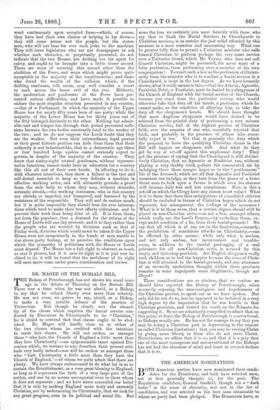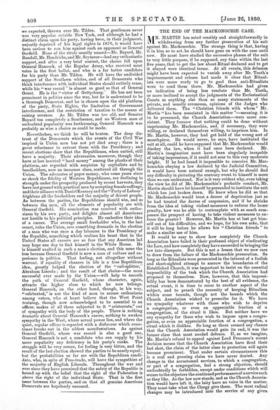THE AMERICAN NOMINATIONS.
BOTH American parties have now nominated their candi- dates for the Presidency, and both have selected men, not at first generally thought of, for the post. The Republican candidate, General Garfield, though not a " dark horse " in the sense of obscurity, was not in the list of candidates, and was selected as the best man obtainable to whom no party had been pledged. The Democrats have, as we expected, thrown over Mr. Tilden. That gentleman never was very popular outside New York, and although he had a distinct claim upon his party, having been, in their judgment, unjustly deprived of his legal rights in 1876, it would have been useless to run him against such an opponent as General Garfield. None of the rivals usually named—Mr. Bayard, Mr. Randall, Mr. Hendricks, and Mr. Seymour—had any enthusiastic support, and after a very brief contest, the choice fell upon General Hancock, of the Regular Army, who received most votes in the first ballot, and who is a far better candidate for his party than Mr. Tilden. He will have the undivided support of the Southern whites, and of all Democrats who think interference with individual States should entirely cease, while his " war record " is almost as good as that of General Grant. He is the "victor of Gettysburg." He has not been prominent in politics since the war, but he is understood to be a thorough Democrat, and he is chosen upon the old platform of the party, State Rights, the limitation of Government interference, and the restriction of taxation to the means of raising revenue. As Mr. Tilden was too old, and Senator Bayard too completely a Southerner, and no Western man of undoubted popularity was forthcoming, General Hancock was probably as wise a choice as could be made.
Nevertheless, we think he will be beaten. The deep dis- trust of the Democrats which the events of the Civil War inspired in Union men has not yet died away ; there is a great reluctance to entrust them with the Presidency ; and recent elections show that the Republicans, when united, still have a majority. Their adversaries, moreover, though they have at last inserted " hard money " among the planks of their platform, are regarded with suspicion by capitalists and by bondholders, now an immense class, scattered all through the Union. The advocates of paper money, who some years since so shook the fidelity of Western Republicans, are declining in strength under the prosperity produced by recent harvests, they have lost ground with practical men by accepting female suffrage, and their alliance with Daniel Kearney and the "Party of Labour" frightens all the freeholders and the majority of decent people. As between the parties, the Republicans should win, and as between the men, all the elements of popularity are with General Garfield. His nomination was received with enthu- siasm by his own party, and delights almost all Americans riot hostile to his political principles. He embodies their idea of a career. The average small freeholder who, in the last resort, rules the Union, sees something dramatic in the election of a man who was once a day labourer to the Presidency of the Republic, something which realises his boast that in the United States all careers are so free that any American lad may hope one day to find himself in the White House. He is himself exalted in such a man's election, and this none the less because General Garfield is now a man of culture and ex- perience in politics. That feeling, not altogether without warrant, if equality of chances in life is a true Republican idea, greatly helped the election of the " rail-splitter," Abraham Lincoln ; and the result of that choice—the most successful ever made by the Union—will help to smooth the path of General Garfield, whose character, again, attracts the higher class to which he now belongs. General Hancock, on the other hand, though, in his way, "celebrated," is not the kind of man to arouse enthusiasm among voters, who at heart believe that the West Point training, though now acknowledged to be essential to an officer, makes of all those subjected to it " aristocrats," out of sympathy with the body of the people. There is nothing dramatic about General Hancock's career, nothing to awaken sympathy in the West, where actual power lies, and where the quiet, regular officer is regarded with a disfavour which some- times breaks out in the oddest manifestations. As against General Garfield, whose war record is also a good one, General Hancock is not a candidate who can supply by his mere popularity any deficiency in his party's ranks. The struggle will be very severe, for feeling is very bitter, and the result of the last election showed the parties to be nearly equal ; but the probabilities so far are with the Republican candi- date, who, in spite of Free-trade, will have the sympathies of the majority of English Liberals. Throughout the war and ever since they have perceived that the safety of the Republic is bound up with the belief that the right of the Federation is above the right of the individual State. That is the first issue between the parties, and.on that all genuine American Democrats are hopelessly unsound.



































 Previous page
Previous page